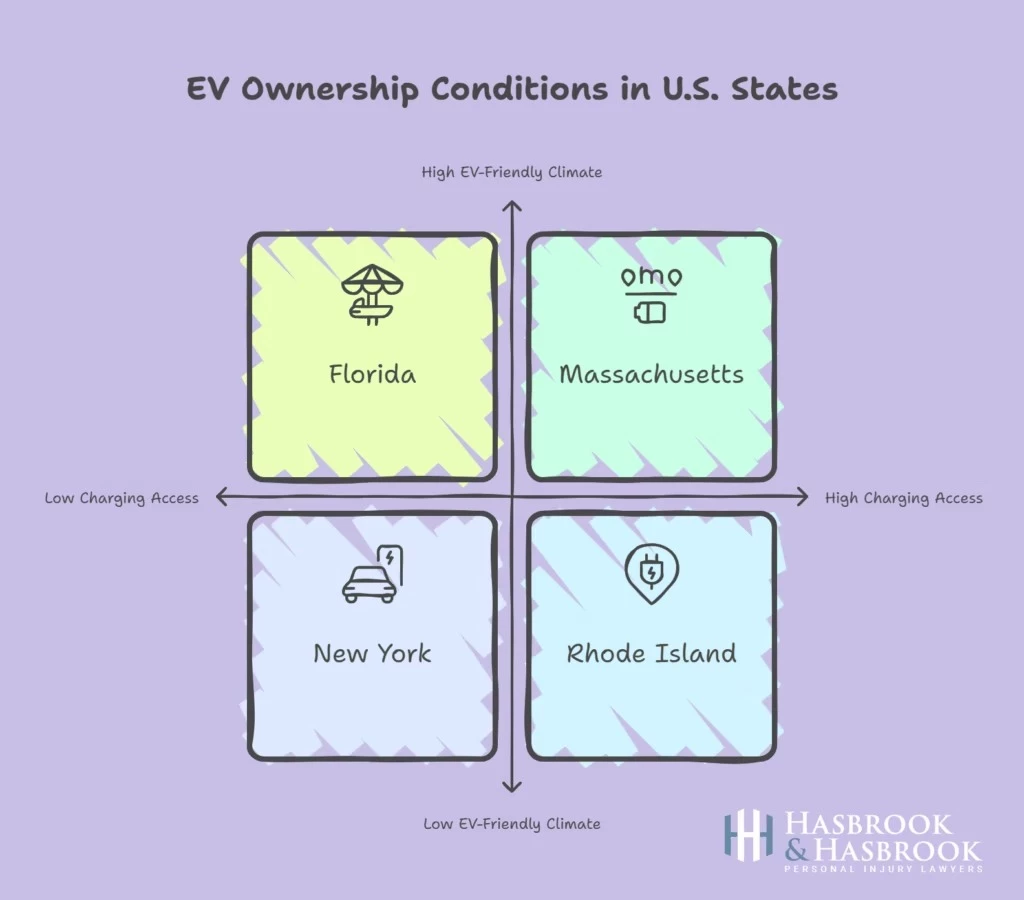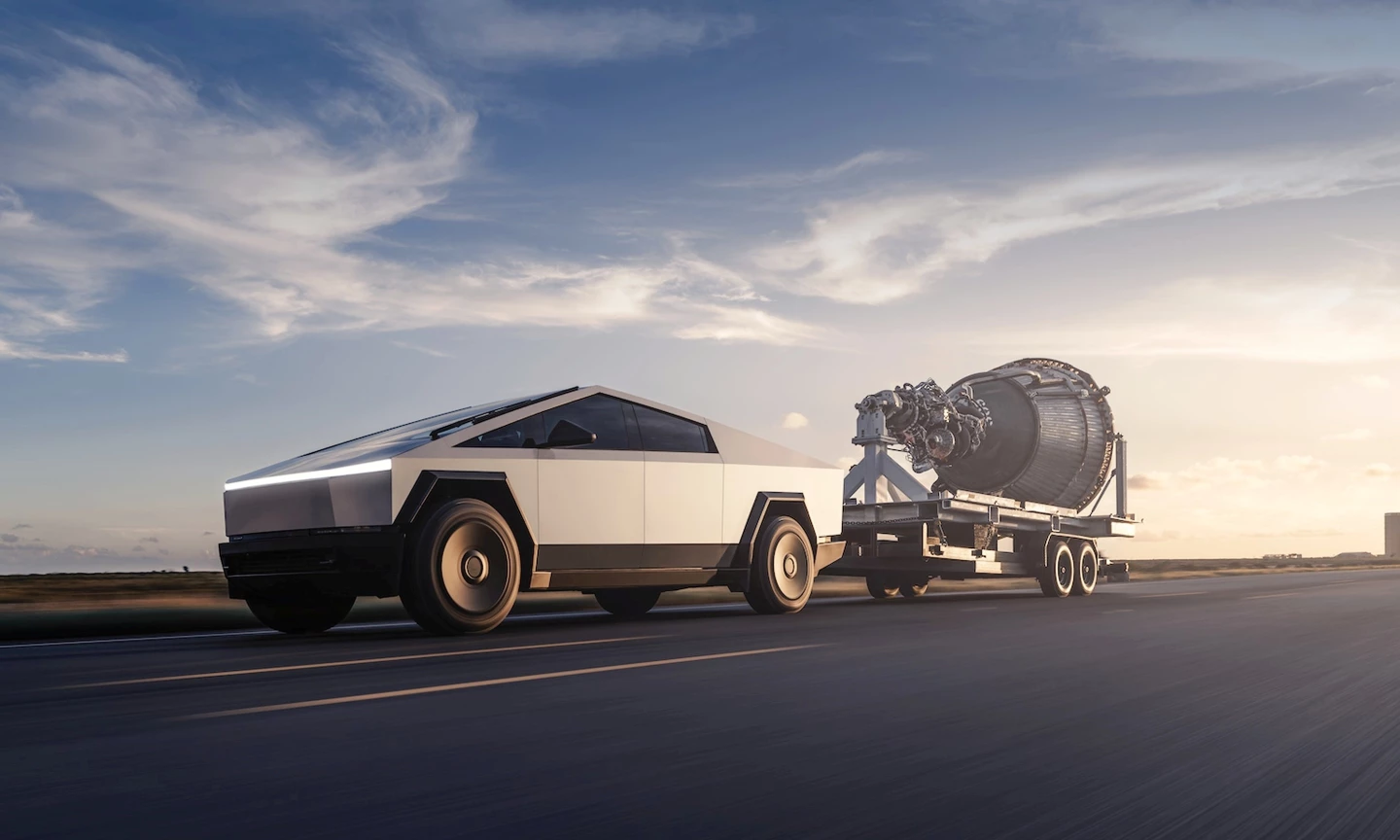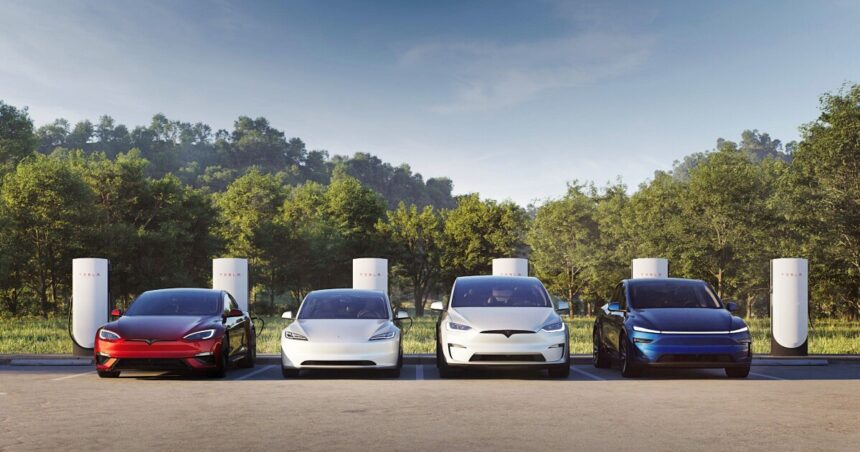Ask anyone in the USA, and they’ll tell you that hippy-dippy, Tesla-lovin’ California is the most EV-friendly state. But what if I told you it’s not even in the top 10?
That’s exactly what the latest study from Hasbrook & Hasbrook Personal Injury Lawyers reveals. It looked at all 50 US states and scored them based on how easy they make it to own an electric vehicle.
The rating takes into account factors including the number of charging ports (per 100 square miles) and charging stations (per 1,000 square miles), road safety, the state’s climate, and what kind of tax rebates the state might offer. On a scale of 1 to 100, each component was given a score, with higher scores indicating better circumstances for EV owners. The size of each state was taken into account when adjusting charging access, and the most significant criteria were given more weight.

Hasbrook & Hasbrook Personal Injury Lawyers
Right, then … so if it’s not the Silicon Valley and Hollywood types, which state is it that loves EVs? Well apparently, Massachusetts is the best place to own an electric car. As per this study, it has the most extensive charging network in the nation, with 1,146 charge ports (per 100 square miles) and 473 charging stations (per 1,000 square miles). This bodes well during those old colonial winters, as frigid climates can zap battery performance. You can reasonably expect a 20-40% loss in range when it’s 20 °F (-6.7°C), so all those charging points makes sense!
It’s also safe(ish) to drive EVs there, thanks to its top-tier road safety ranking of 4. That might seem counterintuitive if you’ve ever driven around Massachusetts – especially in Boston and Worcester – but the Bay State has pretty conservative speed limits (good for EV range) and the lowest vehicle fatality rate in the US. Likely due to all the slow moving traffic, but true nonetheless.
It’s worth noting that federal tax credits for new and used EVs is still alive and well through September 30, 2025, but after that: no more federal tax credits for going electric. That being said, a state-sponsored rebate of $3,500 for a new or used EV helps sweeten the deal in Massachusetts.
Next on the list is Rhode Island. It ranks as the second-best state for EV ownership with a score of 79.2, thanks in part to its good safety rating of 7 and a $2,500 tax credit.

Hasbrook & Hasbrook Personal Injury Lawyers
With 793 charge ports and 323 charging stations, it’s among the most convenient locations for EV charging. Even though it has fewer stations overall than Massachusetts, Rhode Island still provides adequate access because of its smaller overall area.
Third on the list is Connecticut, with a score of 79.1. Interestingly, this is the state that offers the highest tax credit among any of the top three states, at $4,125. EV owners here have nearly as easy charging access as those in Rhode Island, with 779 ports and 266 charging stations.
Following in at fourth and fifth spots are New Jersey and Maryland, with scores of 75.44 and 58.41, respectively. With 677 ports and 216 charging stations, NJ gets a top-tier road safety rating of 5 (How? I’m not sure. If you’ve driven through Jersey, you know what I’m talking about). On the other hand, Maryland follows with 436 ports and 151 charging stations, but its abysmal road safety rating of 18 – where you’re almost as likely to get car-jacked as you are to crash, especially in the DC area – decreases its overall score.

Hasbrook & Hasbrook Personal Injury Lawyers
Maine offers the most generous $7,500 EV tax credit and has the best road safety rank – not hard when half the population is at home, stacking firewood. Florida, on the contrary, has no EV tax credit and is a bit suspect in terms of road-safety if you’ve ever driven there. Retirees often don’t have the fastest reflexes, especially on roadways littered with alligators and iguanas.
Vermont, Delaware, and New York close that top 10 list further on.
It probably helps that everything is relatively close together along the eastern seaboard of the US, unlike the Wild West, where you can drive hundreds of miles of deserted roads without seeing so much as a gas station, let alone electrical infrastructure capable of handling high-voltage DC charging stations.
According to a recent report by the International Energy Agency, over one out of every four new cars sold worldwide this year is electric. On top of that, sales of EVs in the US increased by around 10% in early 2025.
Studies like this help us see how EV adoption is actually evolving versus and how people think it’s evolving – which aren’t always the same thing.
“With EV sales hitting new highs this year, it’s easy to assume tax breaks are driving the shift. But where you live still makes a big difference. States with better charging access, safer roads, and moderate temperatures offer a much smoother experience for EV owners; those are the things that really move the needle,” commented Clayton Hasbrook, who published the original report from Hasbrook & Hasbrook.

Tesla
Now, that doesn’t quite explain why California has become the poster child for EV culture – mental images of “tech bros” and yoga instructors cruising around silently in Teslas pop in my head. But here’s the twist: while California didn’t even crack the top 10 on this particular list, it still absolutely crushes the rest of the US when it comes to sheer numbers.
The Golden State accounts for over 34% of all EVs sold in the US, even though it only makes up 12% of the population. Tesla reigns supreme nationwide (probably because BYD isn’t offered stateside), and California leads the pack. So yeah, the stereotype sticks.
Any guesses why it didn’t rank higher?








